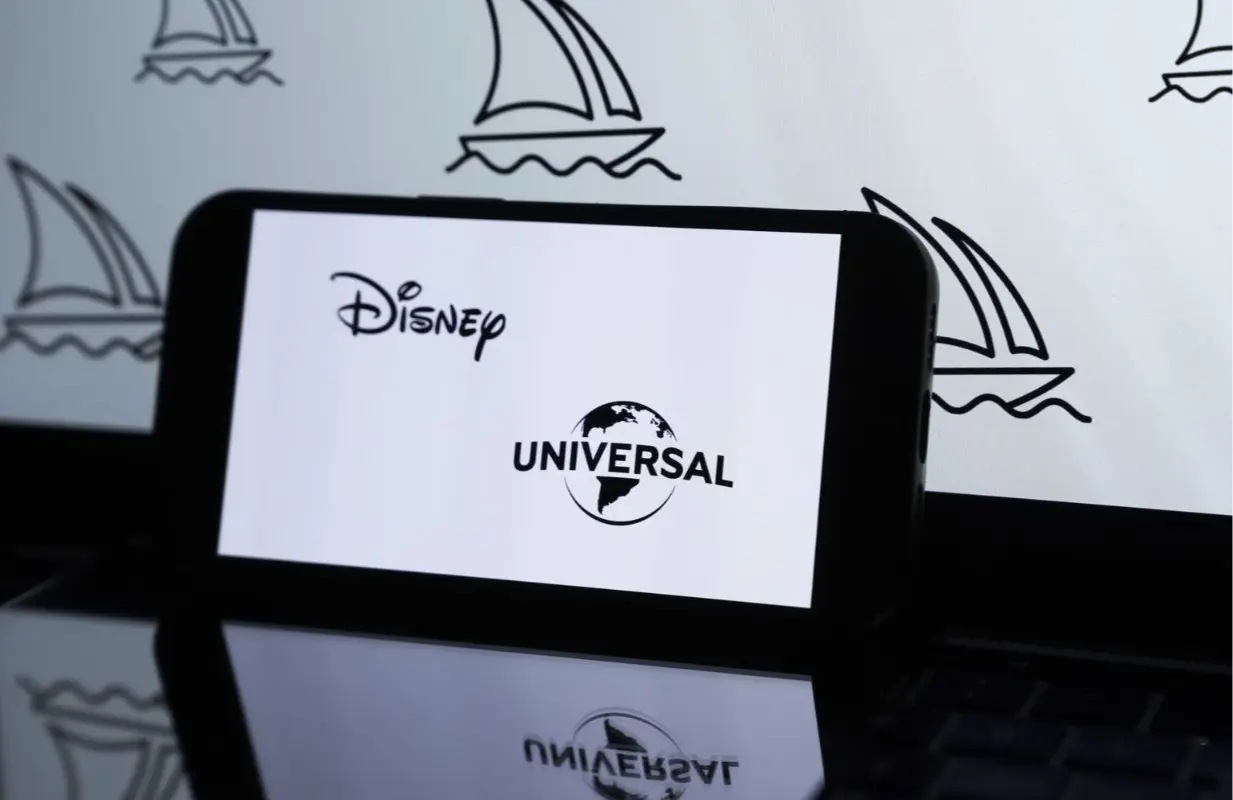Midjourney finally breaks silence on Disney and Universal lawsuit
-
 Photo illustration of Disney & Universal logos (Image via Getty)
Photo illustration of Disney & Universal logos (Image via Getty)In a surprising turn of events, Disney and Universal jointly filed a lawsuit against Midjourney a few weeks back. The Hollywood studios sued the company for its AI-generated images and accused it of copyright infringement.
Recently, Midjourney has officially responded to the copyright lawsuit filed by the globally renowned labels. On August 6, the generative AI program's legal team released an official statement, strongly invoking fair use.
Midjourney asserted that its use of copyrighted material falls under fair use protections, according to a report by Dexerto. The company also pointed out that many of its subscribers have email domains associated with Disney and Universal, implying that the labels themselves might be using and utilizing the advanced platform.
Midjourney has responded to Disney & Universal's lawsuit.
— Boardwalk Times (@BoardwalkTimes) August 7, 2025
Midjourney argues that the studios are trying to “have it both ways," using AI tools themselves while seeking to punish them.
Midjourney argues its use of copyrighted works to train its AI qualifies as fair use. pic.twitter.com/rup8mQhcH0Netizens have been sharing mixed reactions to Midjourney's legal defense. While few supported the platform's fair use claims and questioned the studios' alleged involvement, most criticized the use of copyrighted material without explicit permission. Users are debating both the legal implications and the ethical concerns surrounding AI-generated content.
A look at Midjourney's response to the much-talked-about lawsuit filed by Disney and Universal
Over time, artificial intelligence has slowly marked its presence in millions' everyday routines and also rapidly become a constant source of assistance. While its advantages and implications are often discussed, its control over many of our lives cannot be overlooked. Amid the rising concerns, Disney and Universal joined hands to take the widely discussed legal action against Midjourney in June 2025. The studios emphasized the generative AI platform's association with copyright infringement.
Now, in August, new updates can be heard about this globally significant legal battle.
As Dexerto reported, Midjourney slammed both the plaintiffs, pointing out that they "cannot have it both ways, seeking to profit." On August 6, the defendant released a statement, focusing on the allegations against it. The official document noted,
"Years after its launch, Plaintiffs now take aim at Midjourney in two ways. First, they allege that the process of training an AI model on billions of images violates their rights, even though only a small fraction of those images may contain individual frames from Plaintiffs’ films and shows."
Taking a dig at Disney and Universal, the legal team further stated,
"As a matter of equity, Plaintiffs cannot have it both ways, seeking to profit—through their use of Midjourney and other generative AI tools—from industry-standard AI training practices on the one hand, while on the other hand accusing Midjourney of wrongdoing for the same. But Plaintiffs are also wrong on the merits."
GenAI company Midjourney has responded to Disney and Universal's lawsuit
— Deluxe (@yourboydeluxe) August 7, 2025
They argue it's use of copyrighted works to train its AI qualifies as fair use pic.twitter.com/sicBBcTSBKDetailing the facts about the copyright guidelines, the platform explained,
"Copyright law does not confer absolute control over the use of copyrighted works. The limited monopoly granted by copyright must give way to fair use, which safeguards countervailing public interests in the free flow of ideas and information."
According to the defendant's counterclaim,
"Training a generative AI model to understand concepts by extracting statistical information embedded in copyrighted works is a quintessentially transformative fair use – a determination resoundingly supported by courts that have considered the issue."
Suggesting how the companies "have benefitted" from Midjourney and several similar AI tools, the rebuttal statement described,
"Plaintiffs, collectively representing two of the largest traditional media companies in the world, have benefitted from and continue to benefit from Midjourney and other, similar generative AI tools. Indeed, many dozens of Midjourney subscribers are associated with Plaintiffs’ corporate email addresses, and Midjourney is also a popular tool among the visual effects companies and other vendors employed by Plaintiffs. As Bob Iger, Disney’s CEO, recently exclaimed during a discussion about his company’s utilization of AI, 'technology is an invaluable tool for artists,' and generative AI is no different."
The concerned team also highlighted that this litigation is not about "Midjourney profiteering off of what Plaintiffs call 'infringement'" or about "any purported 'harm' to Plaintiffs; they have identified none." Instead, it focuses on whether the plaintiffs' copyrights allow them to block the use of their work for training generative AI and to stop AI users from incorporating elements of those works, regardless of the final content or purpose.
According to Midjourney, creative rights, as in copyright, have always shared a close connection with
"'freedom of expression, on the one hand, and [] technological improvements in means of dissemination, on the other,' with the law recognizing that limited use of copyrighted material to create new technologies and mediums advances copyright’s ultimate objective: the stimulation of creative expression for public benefit."
Disney & Universal have sued AI company ‘Midjourney’ for copyright infringement
— Captain Atom (@captainatomIDC) August 6, 2025
“Midjourney is… a bottomless pit of plagiarism” pic.twitter.com/KhiZg230OJThe long statement by the popular generative AI platform concluded with,
"Midjourney hereby demands a trial by jury on all claims, counterclaims, defenses, and issues in this action so triable."
Midjourney, in its 43-page filing, strongly denies any violations and maintains that its actions fall within legal bounds. The company is pushing back against the claims and has requested the court to proceed with a trial, asserting its right to defend its practices and challenge the allegations formally.
TOPICS: Midjourney, AI, Disney, Universal